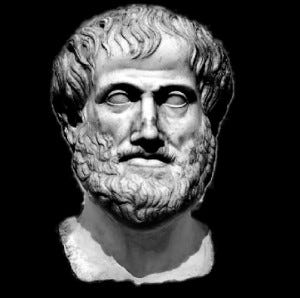On Telos
Vincit qui se vincit: He conquers who conquers himself
In achieving the virtue that is individual excellence, each of them will fulfill his telos. Indeed, it is the shared pursuit of virtue that makes a city a city. - Aristotle
The quote above speaks to the importance of first getting oneself under control, mastering urges and temptations, and then trying to control the outside world. Men want status, control and power. Unfortunately, most men are not intrinsically ready to take the things no one wants to give away for free.
When I was younger I dreamt of being a professional baseball player. I was a good player, not a great player. I was the captain of my high school baseball team. We were a horrible team. At some point I realized that I was not going to be a professional baseball player and I was devastated. Why? Because, I no longer knew what I was going to do. For a man, this is a very difficult thing to handle. I had expectations from my family, I had aspirations of my own, and now things seemed clouded. I was angry, was lost, I was just like millions of other boys - aimless.
The path that I thought was laid out for me vanished. So, I needed to find a new path. My father was not a model I had in my life at the time. No one I knew went to college or was preparing to go to college. I kept searching and searching for the next external thing that was going to guide me. What I soon realized was the fact that I was not ready for something external to guide me internally. I need to start internally first. I needed to ground myself with a new mission, a new vision, and a new sense of inspiration. In short, I needed discipline.
I began working out at the local Gold’s Gym. I found a new passion that I still hold today. I find a sense of flow each and every time I work out. It is my element. 17 was a pivotal age for me. I no longer believed I was going to be a major leaguer and I had just started college. But, what was I to pursue? I didn't know at that time, so I let my passion of health and fitness guide me. I became a NASM certified trainer and hit the floor to gain clientele.
Funny story, I used to tell potential clients I was 21 so that they would trust in my “experience”. For the most part, it worked and I quickly built a book of business. I found a new path. I was going to make myself ass strong and healthy as possibly along with those that I had as clients. Physically I was set, wealth wise I was making good money for a 17 year old, but I still needed something more for my own wisdom and growth.
Telos
In steps Aristotle. At the age of 17 I had no idea that First Principles would become the foundation on which I erected my life’s mental lattice on. I am an Aristotelian and The Philosopher (yes, I said it), was the teacher I needed to master myself. Perhaps, he is the one you need to study from to do the same?
Mans ultimate aim, his telos is to flourish. For me, this really clicked when I read about Aristotle’s concept of Telos.
Aristotle's concept of telos is the idea that everything has a purpose or end goal, and that fulfilling that purpose is what makes something good. For humans, Aristotle believed the telos was to live a life of virtue and cultivate moral excellence in order to achieve eudaimonia, or a state of flourishing and happiness. He argued that all human actions should be aimed at achieving this end, and that living a virtuous life requires balancing competing desires and passions in accordance with reason and practical wisdom. In essence, Aristotle's telos is the pursuit of a meaningful and fulfilling life through the cultivation of moral excellence.



